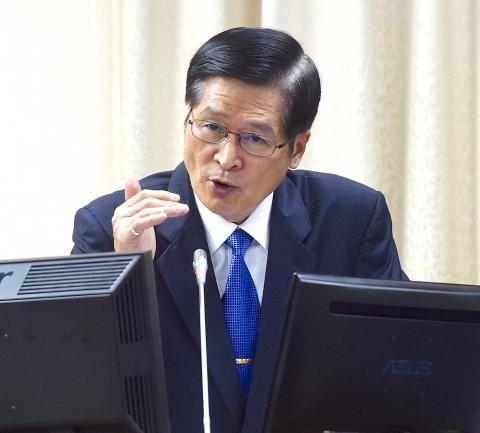A draft bill that would pave the way for NT$250 billion (US$8.05 billion) in funding for Taiwan to buy 66 F-16Vs from the US yesterday passed a preliminary review by the legislature’s Foreign Affairs and National Defense Committee.
The bill, which was approved by the Cabinet and signed off by Premier Su Tseng-chang (蘇貞昌) on Sept. 5, would allow the government to create a special budget of up to NT$250 billion to procure a new fleet of more advanced F-16 jets to reinforce and modernize the military fighter fleet.
The bill will now be sent to a cross-caucus negotiation.

Photo: Chien Jung-fong, Taipei Times
The US Department of State approved the sale of 66 F-16Vs on Aug. 20.
The government and Washington still have to sign a letter of offer and acceptance to finalize the sale, which is expected to happen by the end of this year, the air force has said.
Taiwan hopes to take delivery of all 66 jets, in split shipments, by no later than 2026.
The F-16Vs are expected to be deployed at Chihhang Air Base in Taitung County, military sources said.
The air force in 2016 announced a NT$110 billion program to upgrade its fleet of 142 F-16A/Bs to the F-16V specifications, with the work expected to be completed by 2022.
The first four of the planes, retrofitted by state-owned Aerospace Industrial Development Corp (漢翔航空), have completed combat flight testing.
At yesterday’s committee meeting, lawmakers questioned Minister of National Defense Yen De-fa (嚴德發) and air force leaders about the government’s ambition of buying the more advanced Lockheed Martin F-35s from the US.
Democratic Progressive Party (DPP) Legislator Chen Man-li (陳曼麗) said she understood that delivery of the F-16Vs was expected to begin in 2023 and that the new planes would increase the air force’s fighting capabilities over the short term.
“Do we still have plans to buy F-35s?” Chen asked.
“According to the military’s projected threat assessment, we will need F-35s in the future,” Yen replied.
Independent Legislator Freddy Lim (林昶佐) then asked how soon the nation could expect to obtain F-35s and how the F-16V and the Chengdu J-20, believed to be the most advanced fighter of China’s People’s Liberation Army Air Force, compared.
Yen said the F-16V and the J-20 are about equal, as the J-20’s smaller radar cross-section is matched by the F-16V’s advanced radar system.
DPP Legislator Shih Yi-fang (施義芳) said the characteristics of fifth-generation fighters include vertical take-off and landing and low observability, a class to which Lockheed Martin’s F-22 and F-35, and the Chengdu J-20 belonged.
“Does buying the F-16V mean we are falling behind the curve?” he asked.
Air Force Chief of Staff Liu Jen-yuan (劉任遠) said the F-16V is a 4.5-generation fighter, due to the detection capabilities of its active electronically scanned array radar and infrared search and track systems.
“The J-20’s only advantage is marginally better stealth ability, and modern air combat is fought between integrated systems, not individual platforms,” Liu said.
Shih asked officials to explain if the F-16V could prevail against a J-20 in an one-on-one engagement.
“I have absolute confidence in the skills of our pilots to shoot down a J-20 one-on-one,” Yen said.

The CIA has a message for Chinese government officials worried about their place in Chinese President Xi Jinping’s (習近平) government: Come work with us. The agency released two Mandarin-language videos on social media on Thursday inviting disgruntled officials to contact the CIA. The recruitment videos posted on YouTube and X racked up more than 5 million views combined in their first day. The outreach comes as CIA Director John Ratcliffe has vowed to boost the agency’s use of intelligence from human sources and its focus on China, which has recently targeted US officials with its own espionage operations. The videos are “aimed at

STEADFAST FRIEND: The bills encourage increased Taiwan-US engagement and address China’s distortion of UN Resolution 2758 to isolate Taiwan internationally The Presidential Office yesterday thanked the US House of Representatives for unanimously passing two Taiwan-related bills highlighting its solid support for Taiwan’s democracy and global participation, and for deepening bilateral relations. One of the bills, the Taiwan Assurance Implementation Act, requires the US Department of State to periodically review its guidelines for engagement with Taiwan, and report to the US Congress on the guidelines and plans to lift self-imposed limitations on US-Taiwan engagement. The other bill is the Taiwan International Solidarity Act, which clarifies that UN Resolution 2758 does not address the issue of the representation of Taiwan or its people in

US Indo-Pacific Commander Admiral Samuel Paparo on Friday expressed concern over the rate at which China is diversifying its military exercises, the Financial Times (FT) reported on Saturday. “The rates of change on the depth and breadth of their exercises is the one non-linear effect that I’ve seen in the last year that wakes me up at night or keeps me up at night,” Paparo was quoted by FT as saying while attending the annual Sedona Forum at the McCain Institute in Arizona. Paparo also expressed concern over the speed with which China was expanding its military. While the US

SHIFT: Taiwan’s better-than-expected first-quarter GDP and signs of weakness in the US have driven global capital back to emerging markets, the central bank head said The central bank yesterday blamed market speculation for the steep rise in the local currency, and urged exporters and financial institutions to stay calm and stop panic sell-offs to avoid hurting their own profitability. The nation’s top monetary policymaker said that it would step in, if necessary, to maintain order and stability in the foreign exchange market. The remarks came as the NT dollar yesterday closed up NT$0.919 to NT$30.145 against the US dollar in Taipei trading, after rising as high as NT$29.59 in intraday trading. The local currency has surged 5.85 percent against the greenback over the past two sessions, central